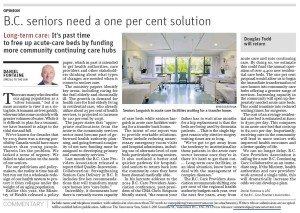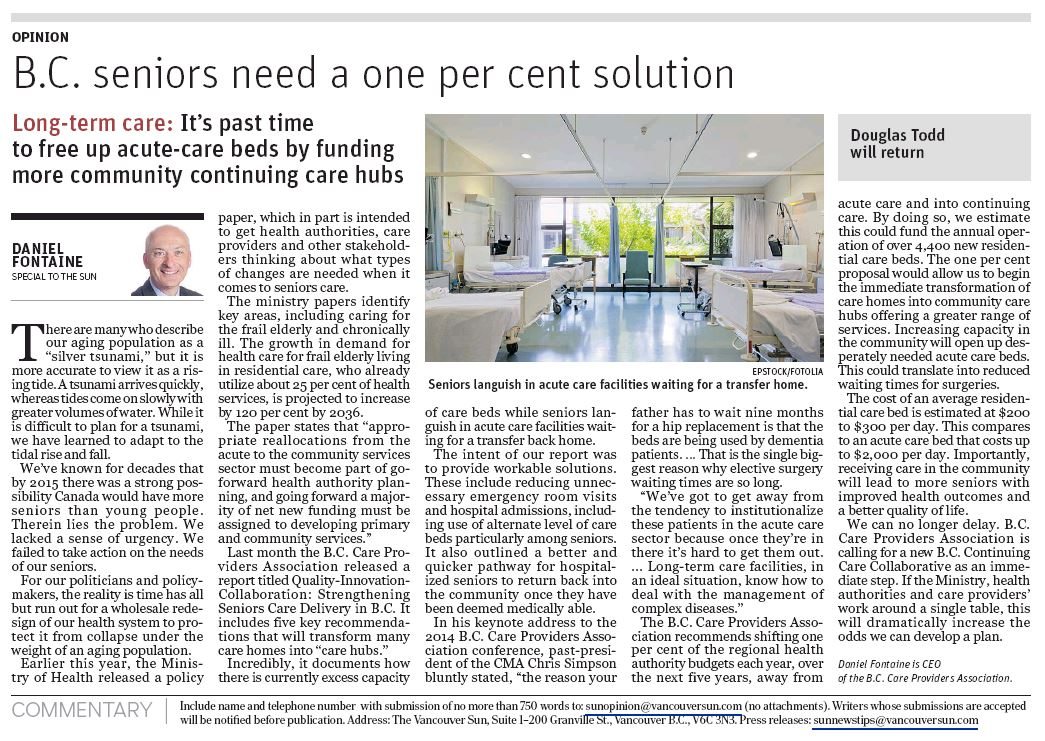The Vancouver Sun published an opinion piece on Saturday, October 17th which was written by CEO Daniel Fontaine. What follows is a copy of it in its entirety.
+++
 There are many who describe our aging population as a “silver tsunami,” but it is more accurate to view it as a rising tide. A tsunami arrives quickly, whereas tides come on slowly with greater volumes of water. While it is difficult to plan for a tsunami, we have learned to adapt to the tidal rise and fall.
There are many who describe our aging population as a “silver tsunami,” but it is more accurate to view it as a rising tide. A tsunami arrives quickly, whereas tides come on slowly with greater volumes of water. While it is difficult to plan for a tsunami, we have learned to adapt to the tidal rise and fall.
We’ve known for decades that by 2015 there was a strong possibility Canada would have more seniors than young people. Therein lies the problem. We lacked a sense of urgency. We failed to take action on the needs of our seniors.
For our politicians and policymakers, the reality is time has all but run out for a wholesale redesign of our health system to protect it from collapse under the weight of an aging population.
Earlier this year, the Ministry of Health released a policy paper, which in part is intended to get health authorities, care providers and other stakeholders thinking about what types of changes are needed when it comes to seniors care.
The ministry papers identify key areas, including caring for the frail elderly and chronically ill. The growth in demand for health care for frail elderly living in residential care, who already utilize about 25 per cent of health services, is projected to increase by 120 per cent by 2036.
The paper states that “appropriate reallocations from the acute to the community services sector must become part of goforward health authority planning, and going forward a majority of net new funding must be assigned to developing primary and community services.”
 Last month the B.C. Care Providers Association released a report titled Quality-Innovation-Collaboration: Strengthening Seniors Care Delivery in B.C. It includes five key recommendations that will transform many care homes into “care hubs.”
Last month the B.C. Care Providers Association released a report titled Quality-Innovation-Collaboration: Strengthening Seniors Care Delivery in B.C. It includes five key recommendations that will transform many care homes into “care hubs.”
Incredibly, it documents how there is currently excess capacity of care beds while seniors languish in acute care facilities waiting for a transfer back home. The intent of our report was to provide workable solutions. These include reducing unnecessary emergency room visits and hospital admissions, including use of alternate level of care beds particularly among seniors. It also outlined a better and quicker pathway for hospitalized seniors to return back into the community once they have been deemed medically able.
In his keynote address to the 2014 B.C. Care Providers Association conference, past-president of the CMA Chris Simpson bluntly stated, “the reason your father has to wait nine months for a hip replacement is that the beds are being used by dementia patients…that is the single biggest reason why elective surgery waiting times are so long.
“We’ve got to get away from the tendency to institutionalize these patients in the acute care sector because once they’re in there it’s hard to get them out. … Long-term care facilities, in an ideal situation, know how to deal with the management of complex diseases.”
 The B.C. Care Providers Association recommends shifting one per cent of the regional health authority budgets each year, over the next five years, away from acute care and into continuing care. By doing so, we estimate this could fund the annual operation of over 4,400 new residential care beds. The one per cent proposal would allow us to begin the immediate transformation of care homes into community care hubs offering a greater range of services. Increasing capacity in the community will open up desperately needed acute care beds. This could translate into reduced waiting times for surgeries.
The B.C. Care Providers Association recommends shifting one per cent of the regional health authority budgets each year, over the next five years, away from acute care and into continuing care. By doing so, we estimate this could fund the annual operation of over 4,400 new residential care beds. The one per cent proposal would allow us to begin the immediate transformation of care homes into community care hubs offering a greater range of services. Increasing capacity in the community will open up desperately needed acute care beds. This could translate into reduced waiting times for surgeries.
The cost of an average residential care bed is estimated at $200 to $300 per day. This compares to an acute care bed that costs up to $2,000 per day. Importantly, receiving care in the community will lead to more seniors with improved health outcomes and a better quality of life.
We can no longer delay. B.C. Care Providers Association is calling for a new B.C. Continuing Care Collaborative as an immediate step. If the Ministry, health authorities and care providers’ work around a single table, this will dramatically increase the odds we can develop a plan.




